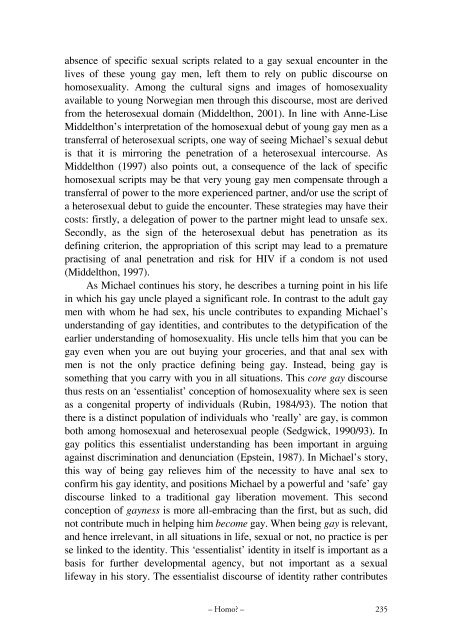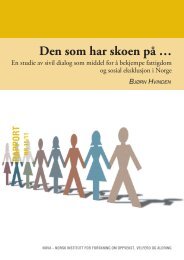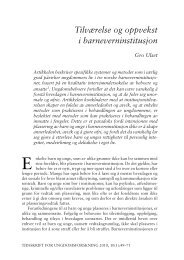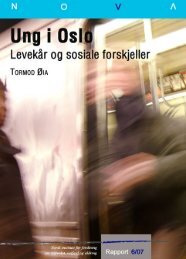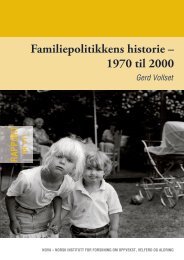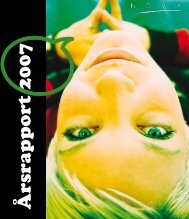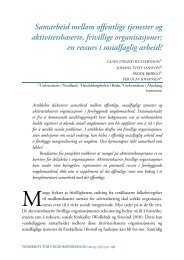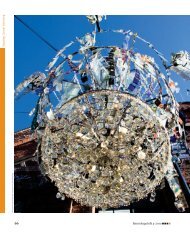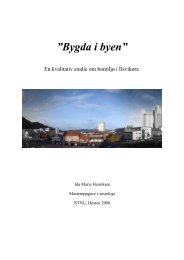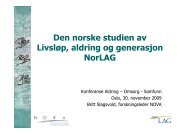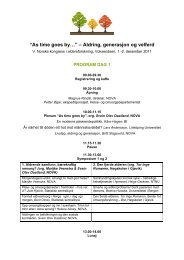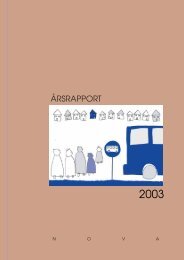Betydningen av seksuell erfaring, tiltrekning og identitet for ...
Betydningen av seksuell erfaring, tiltrekning og identitet for ...
Betydningen av seksuell erfaring, tiltrekning og identitet for ...
Create successful ePaper yourself
Turn your PDF publications into a flip-book with our unique Google optimized e-Paper software.
absence of specific sexual scripts related to a gay sexual encounter in the<br />
lives of these young gay men, left them to rely on public discourse on<br />
homosexuality. Among the cultural signs and images of homosexuality<br />
<strong>av</strong>ailable to young Norwegian men through this discourse, most are derived<br />
from the heterosexual domain (Middelthon, 2001). In line with Anne-Lise<br />
Middelthon’s interpretation of the homosexual debut of young gay men as a<br />
transferral of heterosexual scripts, one way of seeing Michael’s sexual debut<br />
is that it is mirroring the penetration of a heterosexual intercourse. As<br />
Middelthon (1997) also points out, a consequence of the lack of specific<br />
homosexual scripts may be that very young gay men compensate through a<br />
transferral of power to the more experienced partner, and/or use the script of<br />
a heterosexual debut to guide the encounter. These strategies may h<strong>av</strong>e their<br />
costs: firstly, a delegation of power to the partner might lead to unsafe sex.<br />
Secondly, as the sign of the heterosexual debut has penetration as its<br />
defining criterion, the appropriation of this script may lead to a premature<br />
practising of anal penetration and risk <strong>for</strong> HIV if a condom is not used<br />
(Middelthon, 1997).<br />
As Michael continues his story, he describes a turning point in his life<br />
in which his gay uncle played a significant role. In contrast to the adult gay<br />
men with whom he had sex, his uncle contributes to expanding Michael’s<br />
understanding of gay identities, and contributes to the detypification of the<br />
earlier understanding of homosexuality. His uncle tells him that you can be<br />
gay even when you are out buying your groceries, and that anal sex with<br />
men is not the only practice defining being gay. Instead, being gay is<br />
something that you carry with you in all situations. This core gay discourse<br />
thus rests on an ‘essentialist’ conception of homosexuality where sex is seen<br />
as a congenital property of individuals (Rubin, 1984/93). The notion that<br />
there is a distinct population of individuals who ‘really’ are gay, is common<br />
both among homosexual and heterosexual people (Sedgwick, 1990/93). In<br />
gay politics this essentialist understanding has been important in arguing<br />
against discrimination and denunciation (Epstein, 1987). In Michael’s story,<br />
this way of being gay relieves him of the necessity to h<strong>av</strong>e anal sex to<br />
confirm his gay identity, and positions Michael by a powerful and ‘safe’ gay<br />
discourse linked to a traditional gay liberation movement. This second<br />
conception of gayness is more all-embracing than the first, but as such, did<br />
not contribute much in helping him become gay. When being gay is relevant,<br />
and hence irrelevant, in all situations in life, sexual or not, no practice is per<br />
se linked to the identity. This ‘essentialist’ identity in itself is important as a<br />
basis <strong>for</strong> further developmental agency, but not important as a sexual<br />
lifeway in his story. The essentialist discourse of identity rather contributes<br />
– Homo? – 235


